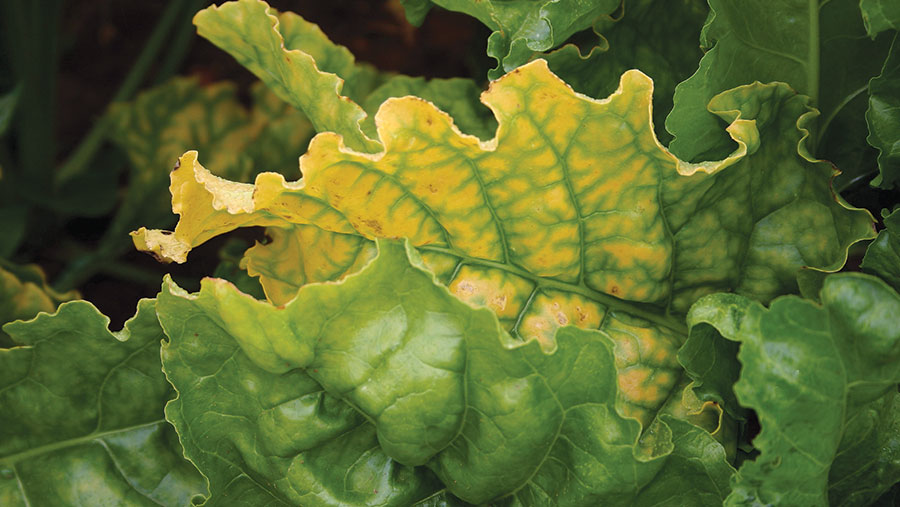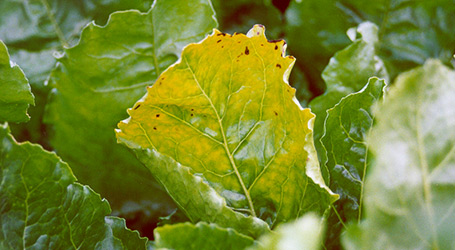
Beet Moderate Yellowness Virus
Beet Mild Yellowing Virus (Bmyv)
Pathogen:
Virus
Type:
Risk:
INTERMEDIATE
Virus
Remolacha de mesa


WHO CAUSES IT?
Beet Mild Yellowing Virus (BMYV) is a virus that primarily affects beet plants, causing a disease known as beet mild yellowing virus. This virus belongs to the Polerovirus genus, within the Luteoviridae family. BMYV is a positive-sense single-stranded RNA virus. Its cycle begins when an aphid, the main vector, feeds on an infected plant, thus acquiring the virus. Aphids transmit the virus to new plants during feeding. Within the beet plant, BMYV replicates in phloem cells and moves through the vascular system, interfering with nutrient transport and causing the characteristic symptoms of the disease. Viral replication and spread are facilitated by proteins encoded by the virus, which contributes to the spread of the pathogen within the plant.
SYMPTOMS
The beet moderate yellowness virus produces a series of symptoms in beet plants that affect their development and yield. The first signs of the disease include slight yellowing of the leaves, which may go unnoticed in the early stages. As the infection progresses, the yellowing spreads and may intensify, affecting plant growth and productivity. Infected plants may also exhibit leaf curling and a general reduction in vigor.
- Slight yellowing of the leaves
- Extension of yellowing throughout the plant
- Leaf curling
- Reduction of plant vigor
- Decreased growth
- Lower crop yield

TEMPERATURE AND HUMIDITY
18°C - 24°C
65% - 80%
TRANSMISSION PATHS
Aphids, infected plant sap, contaminated tools, infected seeds
Do you want to remove this pest? Choose how you want to treat it.
TREATMENTS
Chemical treatment
There are no effective treatments against viruses, the treatments are focused on combating the insect or vector carrying the virus (SEE AVAILABLE TREATMENTS AGAINST INSECTS)
Authorized treatments in organic farming
There are no effective treatments against viruses, the treatments are focused on combating the insect or vector carrying the virus (SEE AVAILABLE TREATMENTS AGAINST INSECTS)
Biological control
-
Recommendations
- Use beet varieties resistant or tolerant to BMYV to reduce susceptibility to the disease.
- Implement an integrated pest management program that includes aphid control through the use of selective insecticides and biological strategies such as promoting natural enemies of aphids.
- Practice crop rotation with non-BMYV host species to reduce disease pressure in the field.
- Maintain good fertilization and irrigation management to reduce stress on plants, which can reduce their susceptibility to the virus.
- Regularly monitor crops to detect the presence of aphids and disease symptoms early.
- Remove and destroy infected plants to prevent the spread of the virus to healthy plants.
- Disinfect agricultural tools and machinery used in infected fields to prevent the spread of the virus.
- Avoid overapplication of insecticides to prevent the development of resistance in aphid populations and maintain the effectiveness of chemical controls.
Sponsored link
Sponsored link
Sponsored link
Sponsored link
Sponsored link
Sponsored link
Effective against all types of fungi
TREATMENTS
Homemade treatments
There are no home treatments
Natural allies
Chemical treatments
There are no treatments for this disease. Treatments are directed at the insect vectors that transmit it. See insect treatments.
RECOMMENDATIONS
- Check the back of the leaves frequently, especially in dry weather.
- Spray water on the leaves to increase humidity and prevent them from settling.
- Keep plants healthy with good watering and adequate light.
- If you see cobwebs or damage, clean the leaves with a damp cloth or pressurized water.
- Use potassium soap or neem oil every few days until they disappear.
REPELLENT PLANTS
Rosemary, Dill, Coriander
RECOMMENDED PRODUCTS TO ELIMINATE THIS PEST
Sponsored link
Sponsored link
Sponsored link
Sponsored link
Sponsored link
Sponsored link
Effective against all types of fungi
*The recommended treatments are still recommendations according to the databases of the authorities and at no time do they replace the guidelines established according to the legislation of each country
*The products shown are recommendations and are not our own products. As Amazon Associates, we earn revenue from purchases of recommended products.






















